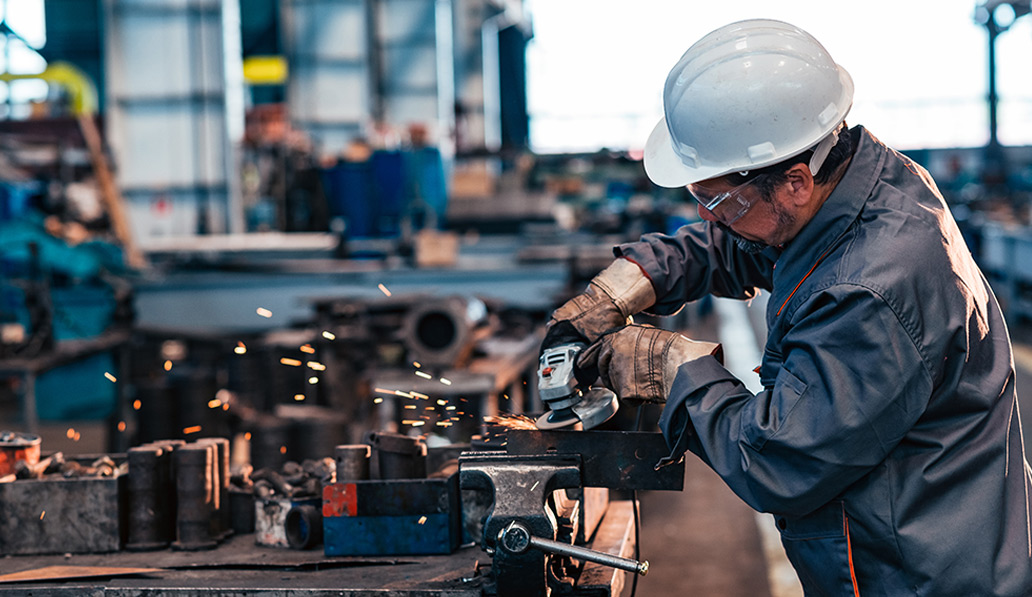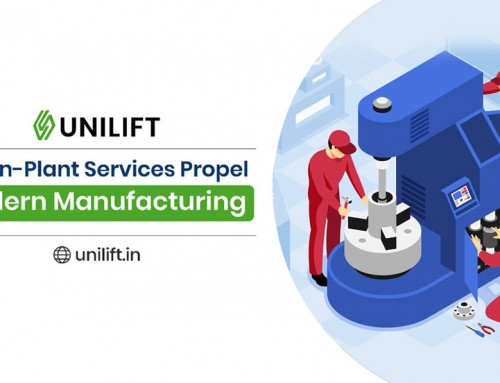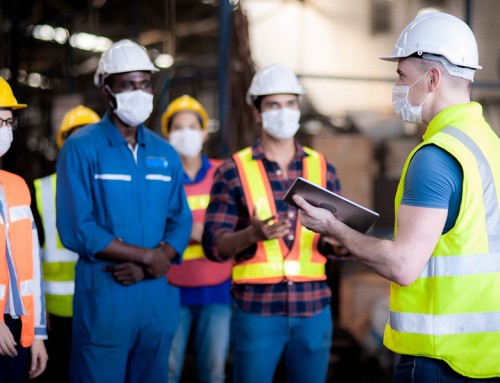Moving goods from Point A to Point B may sound simple, but an experienced business owner / operations manager knows that dealing with supply chain and logistics either within the different points of a manufacturing or shifting between locations, facilities, warehouse and ports can become more complicated than expected. Besides one has to consider various factors such as warehousing solutions, equipment management, manpower arrangement and transportation, not to mention additional compliances such as licenses, labour laws, equipment regulations, environment related permissions, taxes, etc. to think about.
It comes as no surprise that outsourcing the work to an experienced and reputable third-party logistics provider is a preferred option for many companies. The logistics sector has a share of approx 14% in India’s GDP. In India the Material Handling sector has observed a huge growth in the recent years. This has been due to the rising investment in infrastructure and the “MAKE IN INDIA” vision. In the years to come, industrialisation is going to witness a big development and with that the material handling equipment industry is also expected to display considerable growth. The Indian Logistics sector is currently valued at around $ 160 Billion and is expected to grow at 10% CAGR during the period of 2019-2025.
Choosing a logistics service provider is a serious decision. While choosing a partner one has to select a company that one can rely on to help in the movement of the material safely and efficiently, whilst upholding the standards and values of thier own company.
After more than 30 years of experience in the factory operation and maintenance, logistics and MHE industry as well as dealing with customers across industries, locations, and sizes, we have been able to indentify the key factors based on which companies can select an appropriate logistics service partner for their operations:
Area of Expertise
Due to the market growth discussed above in the logistics sector, there is an increased demand for the material handling equipments such as Forklifts, Stackers, Reach Trucks etc. Many companies today prefer to use a third-party logistics service provider for providing these equipments along with equipment operators and maintenance personnel. When searching for the right partner, you will find that most logistics companies having specialties in certain areas of logistics such as In-Plant operations, Warehousing, Road transportation, Air transportation or Shipping transportation. An expert in this sector will be able to provide you with equipments based on your requirement, which will help you to optimise your operations.
In a plant, there are many activities which need material handling equipments including loading / unloading of materials from or into containers and trucks; or stacking of material at height or racks; or movement of materials in confined spaces – a capable service provider will always be able to advise you the most efficient and cost effective ways of handling the material e.g. In a warehouse where space is a constraint and you need more space for storage a good partner can suggest you to use a specialised equipment which can help increase the storage space by almost 15-20%. Similarly for Transportation of goods using Road, Rail, Air or Sea a good partner will always suggest you the safest, cost effective and most efficient way to transport your goods from one place to another.
Hence, it is important for companies looking to partner with logistics service providers to identify the different and critical aspects of their logistics operation and look to engage service providers having the capability, know-how, equipment and manpower resources as well as experience of managing similar operations.
Level of Service and Ability to Foresee Issues

There is no question that you will need to partner with a reliable provider. An unreliable logistics company can quickly affect and damage the good relationship built between your business and its clients and customers. Every load that arrives late, damaged, or on the wrong kind of transport will add extra hours of work to your plate and can strain your relationship with your best clients.
Delay or damage or incorrect issuance of goods can happen at any stage in plant from the production stage right to dispatch stage and even during transit. For example, when the product is correctly placed in the warehouse at the right location and according to a pre-defined and well known process, the chances of sending out wrong material is reduced. A good Service Provider will ensure that Products are stacked in an orderly manner and will follow or suggest the best practices which are most suitable for the maximum output within a pant or warehouse. A proper process also ensures that the dispatch is done without any errors or undue delays. Dispatch of incorrect goods has a negative effect on the reputation of an organisation, not to mention the monetary loss arising due to the wrong dispatches. Even if one wrong pallet is dispatched to the customer, it will cause a much larger ripple effect on the other dispatches for the customer and this in turn will amount to huge losses in this competitive world.
The right partner will always suggest you the best operating model as well as the resources required after doing a thorough study of the products as well as operational requirements. Although it may not always be possible to control variables such as traffic or the weather, it’s important to find a good logistics partner who is able to anticipate potential problems and plan accordingly to ensure that you are delivered the best service every time. The best third-party logistics companies are always anticipating needs and will communicate regularly and openly with you.
Use of Technology
Don’t be afraid to ask prospective logistics partners what technology they use to help improve their services. Using the right technology can not only raise the service level but will also enable both companies to drive down costs. In today’s competitive world of logistics, automation is the best solution forward. Today with the Warehouse management systems in place it becomes very convenient for a company to track their goods and resources. For example, the MHE’s today can be fitted with the Forklift fleet management systems, which not only tracks the location of a forklift within the plant or warehouse, but through its cloud platform can also help the fleet managers to understand the operations of the fleet and the performance of the Operators.
These devices can also prompt the Running Time, Idle Time, Effective working Hours, effective utilisation, work efficiencies or deficiencies like near miss, touch to another surface with the Forklift, impact sensing to name a few important features. By use of technology, the fuel efficiency and optimal utilisation of the material handling equipments can be monitored so also the periodic maintenance which the system will prompt as per the OEM requirement. To stop the misuse of Forklift or to ensure that the equipments are not driven by any unauthorised person equipments can be fitted with Access Controls pin based device which will only allow the authorised personnel to punch their unique codes. To ensure safe movement of equipment in reverse MHE’s can be equipped with reverse camera’s and sensor’s which not only give a visual while travelling in reverse, but can also sound an alarm when the equipment is up to 1 meter from any object. This will alert the Operator regarding impact and save from accidents.
One must look for a company that utilizes technology for the best solutions with the eventual aim of automating processes and minimizing manual intervention, quickly identifying any potential problems within the the supply chain, and accessing a large database of carriers.
Serving You – Today & Tomorrow
When looking for the right logistics partner, do not just search for a company that can help you meet your needs today. If you have plans for business expansion and growth in the future, you will want to know that you are working alongside a logistics company who will be able to help you achieve these goals rather than hold you back. If there are plans for induction of more advanced technologies, procedures and practices which will require a higher level of integration from the logistic partners, it will serve well to evaluate the competencies of prospective partners in respect of the same. As your operations change and grow, it’s vital to find a logistics partner who is able to scale with your business. Ask yourself, will this partner be able to adapt and respond to changing business needs in the long run?
The Right Price
Of course, it is crucial to take the price into careful consideration when choosing a logistics partner. However, it is best to keep in mind that the lowest price is not always the best price and may not convert into the best option. In fact, this can sometimes be the worst choice since lower prices can often signal poorer levels of service, lack of compliance with the labour laws, overriding safety procedures, less efficient management system and problem solving skills, inept resources and less reliability. Even though a logistics company might be able to beat its competitors when it comes to rates, it is always vital to ensure that you will not be compensating for this by putting up with sub-standard operations and failing to reach targets. The cost of incorrect handling of your goods would be lot higher than the price saved on the wrong logistics partner. For any company there are two types of logistics costs, the direct cost which will include In-plant movement of material using the material handling equipments and outside logistics like transportation, external warehouse and other value added services. The other cost is the Indirect cost which includes inventory carrying cost, damage while handling inside the plant or while transporting to the warehouse and also to the customer. The Indirect cost could account for approximately 40% of the total logistics cost which was around $ 310 Billion in the year 2017-18. A good partner can help in reducing the Indirect costs for their client. It is definitely not worth partnering with a logistics company that falls short on customer service, is less visible, and less reliable as a whole.
Safety
Does the logistics provider have a sense of safety? Does a culture of safety emanate from the top management in the company and reflect in the operations, resources and training provided to all its manpower? It is not a difficult task to evaluate whether a particular logistics service provider is only viewing safety as a compliance point to cover or as an essential and integral part of its business ethos.
There is no denying that you have to pay attention to the safety awareness of your logistics provider. In fact, it is absolutely crucial when deciding a logistics partner. A deadly fire in the transferring warehouse will cause huge losses for your business.
Try to check the safety awareness of the logistics provider, their Safety Mechanism and facilities, even safety management.
A good logistics company will offer safety training regularly to their employees, place safety warnings in the right place, manage and monitor a dedicated safety team in its operations, check their facilities regularly, and document a company-wide safety standard in line with the industry safety rules and regulations of the nation. Make sure your products will be sent to the destinations without any damage during the operation of the logistics service provider.
Building a Strong Relationship
The Logistics outsourcing business is essentially a relationship driven business. It is essential for any organisation to build a successful relationship with their Service Provider and vice versa. Understanding the goals and priorities is the key to success for any service relationship. Transparency in work and looking after the benefits of each other goes a long way in building a successful business partnership. Being able to build a healthy working relation means that over a period of time both partners are able to identify the strength and weakness of each partner and work towards helping each other overcome these obstacles to achieve the common goal and succeed in developing the business for the customer.
A great relationship ensures the Service Provider understands the work requirements such as handling goods, proper stacking of goods in warehouse, efficient dispatches, extra working during month-end to meet the company targets of dispatch.
Right Operational Outlook

The logistics partner you deal with should understand your needs and the expectations you have from their services. Rather than viewing its role as simply a provider of resources (equipment and/or manpower), it should understand and appreciate the part it plays in the operation and business of the company.
A partner that is willing to be evaluated on its performance on a regular basis and fulfil operational and compliance parameters, performance matrix, KPIs and other requirements set out for achievement of objectives is more likely to be the right partner in the long run for the company.
An integration of goals as regards output of work rather than supply of resources between the company and the logistics partner is essential to create a mutually beneficial and profitable partnership between the producer and logistics operator.
Compliance
In Human Resource definition, statutory compliance is the legal structure within which any organisation must conduct itself with regards to the treatment of its employees. There are various laws related to the protection, safety and fair treatment of the employees.
Some of the major labour statutes are as follows
- The Factories Act, 1948
- The Minimum Wages Act, 1948
- The Employees Provident Fund & Miscellaneous Provisions Act, 1952
- The Workmen’s Compensation Act, 1923
- The Payment Of Wages Act, 1936
- The Industrial Employment Standing Orders Act, 1946
- The Industrial Disputes Act, 1946
- The Employees’ State Insurance Act, 1948
- The Employment Exchanges(Compulsory Notification Of Vacancies) Act, 1959
- The Apprentices Act, 1961
- The Payment Of Bonus Act, 1965
- The Contract Labour (Regulation & Abolition) Act, 1970
- The Payment Of Gratuity Act, 1972
- The Equal Remuneration Act, 1976
- Inter-State Migrant Workmen (Regulation Of Employment & conditions Of Service) Act, 1979.
- The Child Labour (Prohibition & Regulation Act), 1986
With so many compliance regulations and requirements, companies prefer to outsource the management and compliance of manpower. However it is also essential to select a partner who understands the requirements of various laws and makes no concession in the compliance of the same. While the compliance of these statutes and requirements can sometimes be a time-consuming and ardous process, the consequence of non-compliance by the logistics partners (especially the ones that are operating within your factory premises) can be potentially devastating to the reputation and business of the factory owner. Hence it is very important to give due consideration on the past records of a Service Provider in terms of its capability and acceptance to fulfill all the Statutory Compliances.
Environment
Under the Environment Protection Act 1986, the Environment means the inter- relationship which exists among and between water, air and land, and human beings, other living creatures, plants, micro-organism and property.
Companies are now more inclined to reduce the pollution of the environment. To help curb the pollution all companies have started requesting for Electric Material Handling Equipments which do not emit any smoke or pollute the environment. These equipments are the most eco friendly and also save the environment, not to mention the products which are food grade or electronics which get affected by the fumes coming out of fuel operated equipment. It is also important to follow the norms laid by the government regarding the scrapping or elimination of used Oil and grease which has to be done through certified companies which collect these and recycle them. In India there are approx 36000 industries generating over 70 lakh tons of waste every year. In India there are approx. 250 Oil recycling units which help in conserving resources and limiting the environmental pollution. Similarly for the electric equipments, there are companies which have been appointed for buying and disposing off the acid from the lead acid batteries, and they issue certificates regarding the disposal of the batteries and the acid.
These and other measures can be taken by any company operating in the equipment resource space. As the world moves towards reducing the adverse industrial impact on the environment and protecting the planet and its natural eco-system, a consious and aware logistics partner will assist your company’s efforts towards becoming a more environmentally responsible business entity.
Integrity Culture
Integrity is the practice of being honest and showing a consistency in uncompromising moral values. The Integrity Culture is an extremely crucial aspect while looking for a service partner. It is a very important commitment to Strong Ethical Principles laid by the Management of the company and followed by everyone at all times. It is also the foundation of building relationship and trust with the Organisation. To have integrity means to be accountable, responsible, truthful and consistent in one’s actions. Any company where the Top Management shows a strong beleif in these values, will always encourage and drive its employees towards having the same virtues and dealing with such Organisations will lead to long lasting business relationship.
Finding the right logsitcs partner who meets most if not all of the criteria mentioned above can be a long and challenging process. However the far-reaching and long term impact and benefit of ensuring that your company’s logsitcs operations and support functions are in capable, experienced and consious hands cannot be denied.




